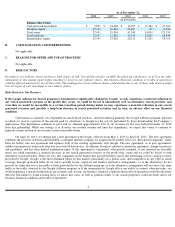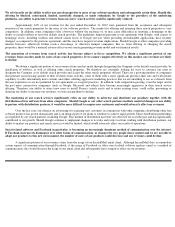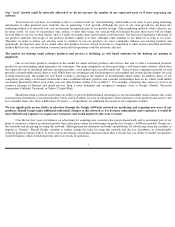Incredimail 2012 Annual Report Download - page 18
Download and view the complete annual report
Please find page 18 of the 2012 Incredimail annual report below. You can navigate through the pages in the report by either clicking on the pages listed below, or by using the keyword search tool below to find specific information within the annual report.
Our financial performance may be materially adversely affected by information technology, insufficient cyber security and other
business disruptions.
Our business is constantly challenged and may be impacted by disruptions, including information technology attacks or failures.
Cybersecurity attacks, in particular, are evolving and include, but are not limited to, malicious software, attempts to gain unauthorized access to
data, and other electronic security breaches that could lead to disruptions in systems, unauthorized release of confidential or otherwise protected
information and corruption of data, and overloading our servers and systems with communications and data. Unidentified groups recently hacked
numerous internet websites and servers, including our own, for various reasons, political, commercial and other. Given the unpredictability of
the timing, nature and scope of such disruptions, we could potentially be subject to substantial system downtimes, operational delays, other
detrimental impacts on our operations or ability to provide products and services to our customers, the compromising of confidential or
otherwise protected information, destruction or corruption of data, security breaches, other manipulation or improper use of our systems and
networks, financial losses from remedial actions, loss of business or potential liability, and/or damage to our reputation, any of which could have
a material adverse effect on our cash flows, competitive position, financial condition or results of operations. Although these attacks, while
causing certain difficulties, have not had a material effect on our business, financial condition or results of operations, there can be no assurance
that such incidents will not have a material adverse effect on us in the future.
New laws and regulations applicable to e-
commerce, Internet advertising, privacy and data collection and protection, and uncertainties
regarding the application or interpretation of existing laws and regulations, could harm our business.
Our business is conducted through the Internet and therefore, among other things, we are subject to the laws and regulations that apply
to e-
commerce and online businesses around the world. These laws and regulations are becoming more prevalent in the United States, Europe,
Israel and elsewhere and may impede the growth of the Internet or other online services. These regulations and laws may cover taxation, user
privacy, data collection and protection, pricing, content, copyrights, electronic contracts and other communications, Internet advertising
(including monitoring and tracking consumer behavior), consumer protection, the provision of online payment services, broadband residential
Internet access, and the characteristics and quality of products and services.
Many areas of the law affecting the Internet remain largely unsettled, even in areas where there has been some legislative action. For
example, there is a degree of uncertainty regarding the level of enforceability of various laws of countries in which our products are being used.
This uncertainty can be compounded when services hosted in one jurisdiction are directed at users in another jurisdiction. Therefore, it is
difficult to determine whether and how existing laws, such as those governing intellectual property, privacy and data collection and protection,
libel, marketing, data security and taxation, apply to the Internet and our business. In February 2012, the Obama Administration unveiled a
"Consumer Privacy Bill of Rights" (the "CPBR"). While the CPBR is not binding, the Obama Administration supports Federal legislation that
will adopt the principles set forth in the CPBR. Even without legislation, the Obama Administration intends to initiate processes that use these
rights as a template for codes of conduct that are enforceable by the U.S. Federal Trade Commission (the "FTC"). The U.S. Commerce
Department prepared a report recommending a "framework" to protect people from a burgeoning personal data-
gathering industry and
fragmented U.S. privacy laws that cover certain types of data but not others. New laws and regulations may seek to impose additional burdens or
restrictions on companies conducting business over the Internet. In Europe particularly, there is a major overhaul of the current European Data
Privacy framework which appears more prescriptive and ambitious and, over the course of the next 12 months, we will begin to understand the
impact of this new proposed regulation, which may demand further change in the way we conduct business and interact with our customers in
Europe. With other national governments also taking steps to enshrine consumer rights (e.g., the U.K. government has proposals to consolidate
all consumer protections into a single new "Consumer Bill of Rights"), the level of consumer protections we face as a business is set to increase.
We are unable to accurately predict the nature of the limitations that may be imposed.
Certain laws and regulations in Israel have recently been adopted or amended, including without limitation, guidelines and requirements
in respect of onward transfer, outsourcing, protection of personally identifiable information and employee related privacy restrictions in the
workplace. Although we strive to comply with such requirements and guidelines, it is possible that such requirements and guidelines may be
interpreted and applied in a manner that is inconsistent with our data collection and preservation practices.
There is currently also uncertainty in relation to the passing of relatively recent online laws. For example, legislation has been enacted
to regulate the use of "cookie" technology. In Europe there is a patchwork of implementation and, in some countries there remains limited
guidance defining good practice. Further, despite the expiration of deadlines for such implementation, some Member States are yet to implement
the relevant Directive and bring their laws into compliance. Upon installation of our software, certain cookies generated by us and our
advertisers are placed on our customers’
computers. It has been argued that Internet protocol addresses and cookies are intrinsically personally
identifiable information that is subject to privacy standards. We cannot assure you that our current policies and procedures would meet these
restrictive standards.
14
























